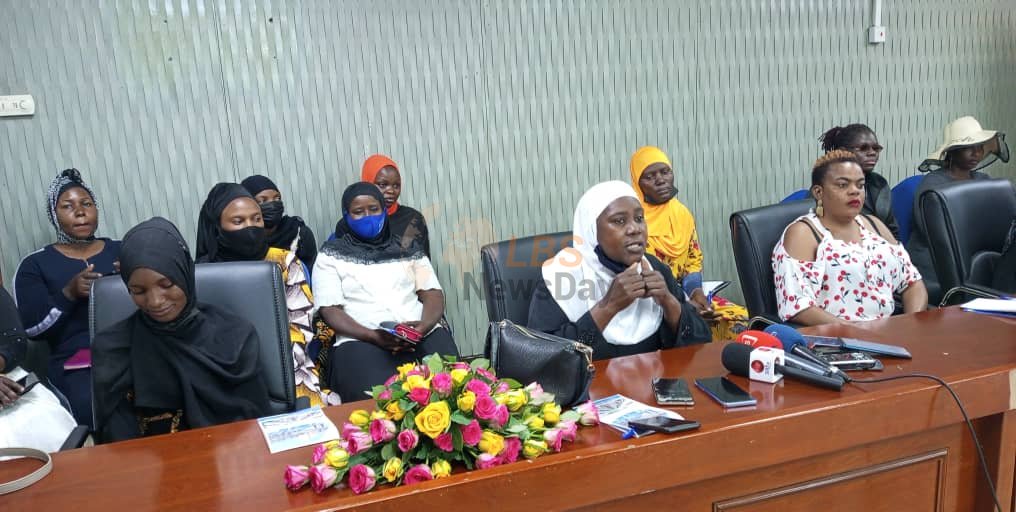Kampala– A section of Ugandans who formerly worked in Saudi Arabia have urged government not to ban labour externalization noting that the move will leave many unemployed amidst high costs of living.
Government is considering a ban on the externalisation of labour, especially to the Middle East due to numerous reports of abuse of Ugandan workers.
Betty Amongi, the minister of Gender, Labour and Social Development on Wednesday, met with labour export sector players at Hotel Africana in Kampala and said that cabinet wants labour externalisation suspended unless they can prove to the president that suffering of Ugandans abroad will end.
However, to the former domestic workers in Saudi Arabia who addressed journalists in Kampala on Thursday, the move once considered will highly affect their income and increase the rate of unemployment in Uganda.
Betty Namugosa is a single mother of four kids who hails from Buwenge, in Buwolelo Nankulyaku, Jinja district. She worked as a house maid in Saudi Arabia for several years and is currently undergoing training to go back for another contract.
While speaking at a press conference in Kampala, Namugosa said, “What took me to Saudi Arabia was the poor living standards. Even the house we were staying in was leaking whenever it rained but right now we are much better. I bought a plot of land, built a house in Jinja city and set up a business in catering services.
On mistreatment of Ugandan domestic workers, Namugosa said, “What is happening in Saudi happens every where including here in Uganda. House helps sometimes get misunderstandings with their bosses and it’s only a few that are being mistreated which shouldn’t lead the majority to lose their jobs or deny an opportunity those intending to go there.
Prossy Zawedde worked in Saudi for four years and is currently a trainer which she has done four years now.
She says, “In my first contract I didn’t get much but in the second one, I was able to acquire plots of land. I wouldn’t have what I have had I not gone there. I don’t support the move to stop Ugandans from working in Saudi Arabia.
“We have gained alot from working in Saudi. Here in Uganda there are no jobs that we can engage in. Some of us didn’t go far with education but even those that went far, they have no jobs.” Zawedde Says.
She adds that another contributing factor for Ugandan women seeking employment in Saudi Arabia is domestic violence. “Many women separate with their spouses due to mistreatment and go to Saudi. Where will you put all these women when there are no jobs here. Some of them will end up committing suicide or end up doing criminal activities.
Nakate Fatuma is one of luckiest Ugandans who has reaped big from working in the middle East country.
Fatuma who is also under training to fly back for another contract narrated to press her experience working in Saudi Arabia, “I went to Saudi in 2015 and worked as a Kadama for four years in certain house. I must say I lucky to have a nice boss. My boss would give me salary advance whenever I needed it, took me for Hajj in Mecca, gave me money to construct a bore hole for our mosque back home in Namaliiri, Kasawo, Mukono district and could give me money to buy animals for my people on Eid-al-Adha which I would send to four mosques at home. I would liase with my people to take photos for all these things for proof.
She added, I’m now a landlord and I pay school fees for my children. I want to go back and get more money and start myself a business where I will settle.
These however want government to review an agreement it signed with Saudi Arabia to raise their pay.
They say despite being given harder tasks compared to their counterparts from other countries they are the least paid. They now want government of Uganda to intervene and ensure that their monthly salaries are increased from the current Shs900,000 to at least 1.5M.
“We earn Shs900,000 whereas the Phillipinos, those from Indonesia, the Ethiopians get 1.5m and yet we are the most hardworking. Uganda needs to work with Saudi Arabia so that our monthly pay is also increased to match with the rest.” Says Namugosa
According to statistics from Uganda’s Ministry of Gender Labour and Social Development, from 2016 to date, at least 223,102 domestic and professional migrant workers have left the country for the Middle East. Saudi Arabia takes a lion’s share of 131,970 domestic workers.



